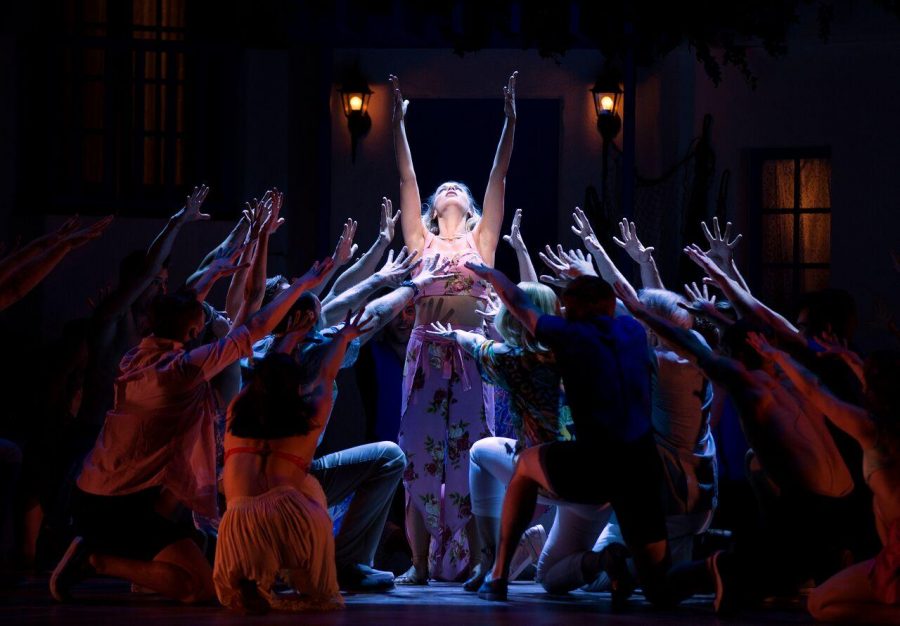In “Mamma Mia!” now playing at Pioneer Theatre Company, audiences nostalgically look back to a simpler time watching characters nostalgically reflect farther to an even simpler time. On stage, the characters live in 1999, the music comes from the heyday of the 1970s and the audience is mostly relieved they can escape 2018. Maybe all of this decade hopping made me dizzy, but during this production I longed for a truly bygone era — one in which the jukebox musical was not a dominant Broadway form.
Set on a sleepy Greek resort, — a set designed by James Kronzer — the musical focuses on the wedding preparations of twenty-year-old Sophie played by an appealing Kathryn Brunner. Everything seems to be going perfectly — except Sophie wants her father, who she has never met, to walk her down the aisle. She contacts three possible candidates — Paul Castree, Dan Sharkey, and Brian Sutherland — and invites them to her wedding, to the chagrin of her mother Donna played by Coleen Sexton. Donna is now a responsible single mother, but in her 20s she was a carefree rebel who fronted a girl group. (Does this give the musical an excuse to include a litany of hit disco songs? The answer will definitely not surprise you.)
Nobody goes to jukebox musicals for narrative complexity, but even by the lowest standards, the plot of “Mamma Mia!” is ludicrous. The central conceit is an unholy matrimony of sitcom clichés and watered-down Jerry Springer fodder. The problem is that the story is solely a medium to perform preexisting songs by ABBA, the Swedish pop group which ruled the charts in the 1970s. With a few exceptions, the songs are awkwardly squeezed in to vaguely move the plot forward. Even the best ABBA songs do not lend themselves well to storytelling — they are neither lyrically detailed nor emotionally evocative. This cast performs most of the score — especially the up-tempo numbers — with professionalism, but even the most fun moments of “Mamma Mia!” can never answer why “Mamma Mia!” exists to begin with.
As Donna, Sexton gives her all vocally, but her performance cannot overcome the weakness of the script. For a former disco queen, Donna is a real bummer to be around, and by the ballad-heavy act two, most of her scenes turn dour and unpleasant. The three baby daddy candidates don’t fare much better — all are too bland and underdeveloped to invest in as 1970s pop hit vehicles, let alone as fully developed characters. Castree, Sharkey and Sutherland are stiff and unsure of how to navigate their thankless roles.
In general, the less serious a character is in “Mamma Mia!” the better the actor comes across. Naturally, the show is more comfortable in sparkly bell-bottoms than a sparkly business suit. This production’s young, inexhaustible ensemble is consistently good. In one particular highlight, a group of male dancers dances to the song “Lay All Your Love on Me” in scuba suits and flippers; it’s better not to ask. Amy Bodnar makes the most of her thinly written role as Tonya, Donna’s former bandmate and a shallow, wealthy divorcee. I’m not sure we needed any more golddigger jokes after the first half-dozen, but Bondar makes these punch lines more successful than they have any right to be.
The clear MVP of this production is Mary Fanning Driggs, who regularly steals scenes as the goofy sidekick Rosie. Driggs performs even the corniest lines with admirable gusto, and her performance of “Take A Chance on Me” is the clear breakout moment of the show. It helps that the song is the one truly clever integration of music in the show, and Driggs milks every possible opportunity for inspired moments of physical comedy. As she shimmies, struts and flirts her way through the song, she not only provides the most purely entertaining part of the performance, she gives a four-minute template for a much better musical. “Mamma Mia!” is never going to be Oscar Wilde, but Driggs owns the show’s ridiculousness and brings out the camp and playfulness the rest of the musical sorely needs. In this small but notable moment one can imagine an alternate universe musical which functions as more than a glorified greatest hits album.
“Mamma Mia!” runs from May 11 – May 26 at Pioneer Theatre Company. Performances will be at 7:00 p.m. on Mondays through Thursdays and at 7:30 p.m. on Fridays and Saturdays, with an additional 2:00 p.m. matinee on Saturdays. For ticket pricing, including information on discounts for U of U students, visit pioneertheatre.org.



Walt and Eileen Petersen • Aug 6, 2018 at 8:23 pm
We love to read Josh Petersen’s articles for the astute vocabulary he incorporates in each sentence.
Keep it coming, Josh.
SQ • May 26, 2018 at 7:47 pm
Great review, JP!
With all the faults of Mamma Mia!, this production is way better than the movie version starring Meryl Streep.